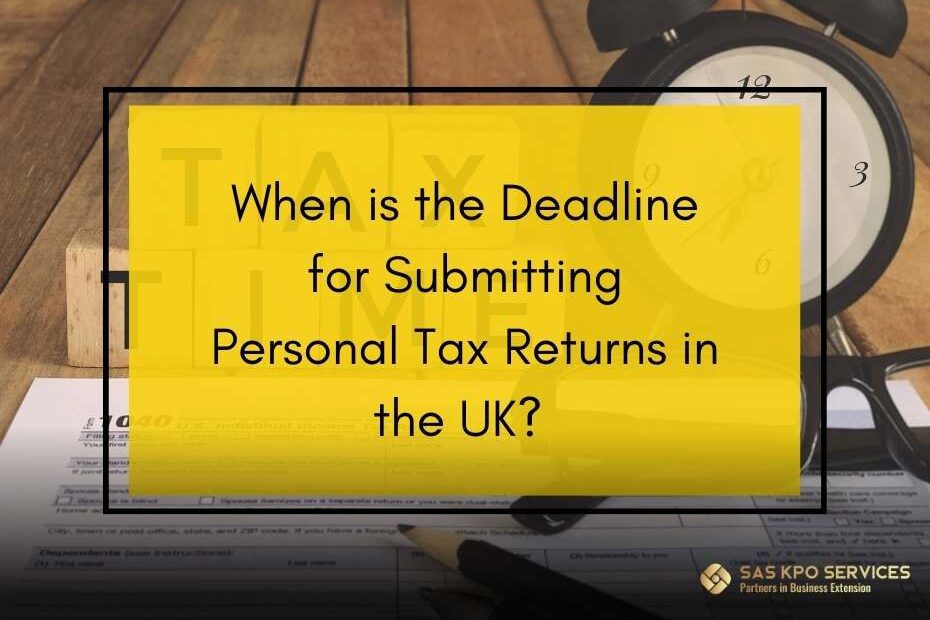A personal tax return is a set of forms you send to the tax authorities that show your income, deductions, tax credits, and other financial details for the year. At SAS KPO Services, we offer tax preparation services that help you outsource accounting tasks so you can focus on growing your business. By outsourcing, you can cut costs, improve efficiency, and scale your business without worrying about expensive software or training staff. Outsourcing also improves financial planning, reduces mistakes in tax filings, and gives you access to advanced technology, making the whole process easier. Your tax return will show your total income from various sources, allowable deductions, tax credits, and any payments you’ve made during the year. Deadline for submitting personal tax returns in the UK-
To submit your tax return for the 2024/25 UK tax year (which runs from April 6 to April 5), keep these Self-Assessment dates in mind:
- October 5: Deadline to inform HMRC if you need to file online.
- October 31, 2024: Deadline for submitting a paper tax return.
- January 31, 2025: Deadline for filing an online tax return.
When Is the Deadline for Submitting Personal Tax Returns in the UK? The deadlines are strict, but if HMRC tells you to file online after October 31, 2024, you’ll have three months from the notice date to finish it. Lastly, the deadline to pay the second installment of your current tax year’s liability is July 31.
A Personal Tax Return Includes a Few Important Parts that Help Calculate How Much Tax You Need to Pay

Income:
This covers all the money you’ve earned throughout the year. It includes things like wages from your job, salaries, dividends from investments, capital gains from selling assets, rental income if you rent out property, and other forms of earnings. All these sources of income must be reported to the tax authorities.
Deductions:
These are specific expenses that can help reduce your taxable income. By claiming deductions, you lower the amount of income that gets taxed. Common deductions include interest on student loans, mortgage interest, donations you’ve made to charities, or contributions to retirement savings accounts. By reporting these deductions, you can reduce the amount of tax you have to pay.
Tax Credits:
Tax credits work differently from deductions. Instead of reducing your taxable income, they directly reduce the amount of tax you need to pay. Some examples of tax credits include the Child Tax Credit, which lowers the tax burden for families with children. These credits are a great way to reduce your overall tax payment.
The personal tax return process is essential for making sure people follow tax laws and pay the right amount of taxes for the year. Filing a personal tax return ensures that you are being transparent with your financial activities and that the correct amount of tax is being calculated and paid based on your income, deductions, and credits. This process helps the government collect taxes efficiently while allowing individuals to take advantage of deductions and credits to lower their tax bills where appropriate.
When does the UK Tax Year Start?

In the UK, the tax year officially begins on April 6th. This date marks the start of the financial period when both individuals and businesses need to track their income, expenses, and any deductions. During the tax year, everything from wages, business earnings, investments, and other sources of income are monitored and recorded. These records will be used to file tax returns with HM Revenue and Customs (HMRC).
From this point, taxpayers have to ensure they keep all relevant financial documents and receipts organised. These will help show the government exactly how much money they’ve made, what costs they’ve had, and any deductions they are eligible for.
The start of the tax year is a key time for planning finances. People and businesses need to prepare for managing their income and expenses in a way that keeps them on top of their tax obligations. It also provides an opportunity for financial planning, like contributing to retirement accounts or making charitable donations, to help reduce taxable income. Starting on April 6th, the clock begins ticking for the financial year ahead, and it’s important to stay on top of your tax obligations from the beginning to avoid issues later.
When does the UK Tax Year End?

In the UK, the tax year ends on April 5th of the following year. This is the last day of the financial period when both individuals and businesses must wrap up their accounting records. After this date, it’s time to prepare and submit all necessary paperwork to HM Revenue and Customs (HMRC) for your tax return.
As the end of the tax year approaches, it’s important to make sure you have all your financial documents in order. This includes gathering details on your income, expenses, investments, and any deductions you can claim. Whether it’s pay slips, invoices, bank statements, or receipts for business expenses, everything needs to be accounted for to ensure your tax return is accurate.
The end of the tax year is a busy time for taxpayers and it’s also deadline for submitting personal tax returns in the UK, as they need to finalise all their financial activities for the year. It’s also a critical moment for reviewing your tax strategy. By making sure everything is in place before April 5th, you can avoid any last-minute rush, prevent errors, and potentially reduce the amount of tax you owe by claiming deductions or tax reliefs. Preparing ahead of the April 5th deadline helps make the entire tax process smoother, ensuring you meet your tax obligations on time and avoid any penalties for late filing.
What are the Benefits of Filing Your Self-Assessment Tax Return Early?

Filing your self-assessment tax return early offers several important advantages that can save you time, money, and stress. Here are some key benefits:
Lower Risk of Penalties and Fines:
When you file late, you run the risk of facing penalties and interest charges. By submitting your tax return early, you can avoid these issues and ensure that you meet all tax deadlines. This gives you peace of mind, knowing you won’t accept unnecessary costs.
Time for Corrections:
Filing early gives you the opportunity to review your return thoroughly. If you find any mistakes or need to adjust, you have extra time to correct them without feeling rushed. This means you can ensure everything is accurate and complete before the deadline.
Faster Refunds:
If you’re expecting a tax refund, filing early can help you get it sooner. The sooner you submit your return, the quicker the tax authorities can process it and issue your refund. This gives you quicker access to your money, which can be beneficial for your financial planning.
Avoiding Last-Minute Stress:
Filing your tax return at the last minute can be incredibly stressful. By submitting your return early, you can avoid the last-minute rush and the anxiety that often comes with it. This also reduces the chances of making errors that can happen when you’re in a hurry.
Preventing Tax Identity Theft:
Filing your tax return early helps protect you from tax identity theft. If someone tries to file a false tax return in your name after you’ve already submitted yours, their attempt will be rejected. This gives your financial data still another degree of protection.
In summary, filing your self-assessment tax return early not only helps you stay compliant with tax laws but also provides you with the time and security you need to handle your finances effectively. Taking this proactive step can lead to a smoother tax season and greater peace of mind.
What are the Ways to Minimise Personal Tax Return?

Reducing your personal tax return can be achieved through various strategies, including tax reliefs, deductions, and careful planning. Here are several effective methods to help you lower your tax bill:
Marriage Allowances:
If you are married or in a civil partnership, you can transfer part of your personal tax allowance to your spouse, provided they earn within the basic tax rate band. For the tax year 2024/25, you can give up to £1,260 of your allowance. This can significantly help reduce your spouse’s tax bill, making it a smart move for couples.
Charitable Donations:
Donating to charity not only benefits the community but also provides tax relief through Gift Aid. When you donate, charities can claim an additional 25% from the government on top of your contribution. This means your donation goes further and can lower your taxable income.
Tax-Free Savings for Children:
Setting up a pension for your children can be a great way to save for their future while also reducing your household’s taxable income. These savings can grow tax-free, making it an excellent option for long-term financial planning.
Claiming Child Benefit:
If your income is below £50,000, you can claim full child benefit without tax issues. However, if your income exceeds this amount, you may be subject to the High-Income Child Benefit Charge, which could reduce or eliminate your benefit. It’s essential to understand how this works to maximise your claims.
Claim Work-Related Expenses:
If you are self-employed or incur expenses related to your job, you can deduct these costs from your taxable income. This may include expenses for office supplies, travel, or professional membership. Ensure that all expenses are legitimate and well-documented to qualify for deductions.
Contributing to a Pension:
Investing in a pension scheme, whether it’s a personal pension or a workplace pension, can lower your taxable income. You receive tax relief on your contributions, which can effectively reduce your overall tax bill. It’s a great way to save for retirement while also benefiting from immediate tax savings.
By taking advantage of these strategies, you can effectively minimise your personal tax return. Implementing smart financial planning can help you keep more of your hard-earned money while ensuring compliance with tax laws. Always consider consulting with a tax professional for tailored advice based on your unique financial situation.
What Would Happen If I Missed the Deadline for the UK Self-Assessment?

Missing the UK Self-Assessment tax return deadline can lead to several consequences, including penalties and interest charges. Here’s a breakdown of what you can expect if you don’t file on time:
Immediate £100 Late Filing Penalty:
If you miss the deadline for submitting personal tax returns in UK, which is usually January 31st, you will automatically receive a penalty of £100. This penalty applies even if you have no tax to pay or if you have already paid your tax.
Penalties for Extended Delays:
If you continue to delay your filing, additional penalties will follow:
- Over 3 Months Late: You will incur an extra charge of £10 per day for each day you are late, up to a maximum of £900 (90 days).
- Over 6 Months Late: You will face a further penalty of either 5% of the tax due or £300 (whichever is higher).
- Over 12 Months Late: Another penalty of either 5% of the tax due or £300 (whichever is higher) will be added. In some situations, if HMRC believes you are deliberately withholding information, penalties can increase up to 100% of the tax due.
Interest on Late Payments:
If you need to pay any tax and miss the payment deadline, you will also start accruing interest on the amount owed. This interest is calculated from the due date (January 31st) until you pay the tax in full. HMRC sets the interest rate, which is subject to change.
Late Payment Penalties:
Alongside interest, if your tax remains unpaid, you may face additional penalties:
- 30 Days Late: You will incur a penalty of 5% of the tax owed.
- 6 Months Late: A further 5% of the tax owed will be added.
- 12 Months Late: Another 5% of the tax owed will be charged.
Reduced Time for Appealing Penalties:
Missing the deadline limits your options for appealing any penalties. You can only avoid these penalties if you can prove you had a “reasonable excuse” for being late, such as illness, bereavement, or unforeseen technical problems.
Possible Loss of Repayment Interest:
If HMRC owes you a tax refund but you miss the filing deadline, you will not receive any interest on the repayment for the time you delayed filing your return.
Increased HMRC Scrutiny:
Frequent late filings may lead to increased attention from HMRC, which could result in audits or further inquiries into your tax situation.
In the end, missing the personal tax returns deadline can be costly and lead to a host of problems. To avoid these issues, it’s best to file your tax return on time. If you find yourself in a situation where you might miss the deadline, it’s advisable to seek assistance or advice to navigate your options effectively.
Why is the End of Tax Year Important?

The deadline for submitting personal tax returns in UK is a significant date for individuals and businesses, particularly in the UK, where it falls on April 5th. Understanding its importance can help you make the most of your finances. Here are some key reasons why the end of the tax year matters:
Tax Planning Opportunities:
- Boost Contributions: It’s a great time to increase your contributions to pensions or Individual Savings Accounts (ISAs). By doing this, you can maximise your tax benefits for the year.
- Asset Transfers: You can move assets between spouses to take advantage of better tax benefits, which can lower your overall tax burden.
- Postponing Income: Consider delaying income or capital gains to the next tax year to avoid falling into a higher tax bracket, which could save you money.
Final Chance for Tax Planning:
The end of the tax year is your last opportunity to utilise tax reliefs and allowances before they reset or change. For example, you could:
- Increase your ISA contributions to benefit from tax-free savings.
- Make additional pension contributions to reduce your taxable income.
- Use allowances like the annual gift exemption for inheritance tax, helping you plan for the future without additional tax costs.
Assessment of Income and Tax Liability:
It’s essential to calculate your total income and estimate the taxes you need to pay based on that income. This assessment helps determine:
- How much tax do you need to pay.
- Whether you’re entitled to a tax refund, ensuring you manage your finances effectively.
Preparation for Tax Returns:
The end of the tax year is the time to gather all the necessary financial documents and information needed to file your tax return. This preparation includes:
- Organising details about your income, deductions, and credits to ensure accurate tax reporting.
- Meeting legal requirements for your tax obligations, which can help avoid potential issues.
Review and Adjustment of Financial Plans:
This period is crucial for assessing your financial situation. Reviewing your income, investments, and expenses before the tax year ends allows you to:
- Adjust your financial strategies, such as selling or transferring assets to improve your tax outcomes.
- Make informed decisions about adjusting your contributions to savings and pensions for better future planning.
Charitable Giving:
The end of the tax year is a key time for making charitable donations if you want them to qualify for that year’s tax relief. By donating before the year ends, you can:
- Claim Gift Aid relief on your next tax return, enhancing the impact of your charitable contributions.
Tax Code Updates:
At the end of the tax year, HM Revenue and Customs (HMRC) updates tax codes for the new year. Knowing your new tax code helps ensure:
- The correct amount of tax is deducted from your income throughout the upcoming year.
- You are aware of any changes that might affect your tax liability.
In summary, the end of the tax year is an essential time for planning and preparation. By taking proactive steps, you can maximise your tax savings, avoid penalties, and ensure that you are financially ready for the year ahead.
Conclusion
The deadline for submitting personal tax returns in UK is a critical time for both individuals and businesses to review their financial strategies, ensure compliance with tax regulations, and take advantage of available reliefs and deductions. Proper planning and timely action can make a significant difference in reducing tax liabilities and setting a strong foundation for the year ahead. At SAS, we understand the complexities of tax preparation and offer comprehensive outsourcing solutions that streamline your accounting processes, allowing you to focus on what truly matters—growing your business.
Contact us today to learn more about how our expert team can help you with tax preparation and all your accounting needs. Let us be your trusted partner in achieving efficiency, reducing costs, and enhancing your financial planning.

